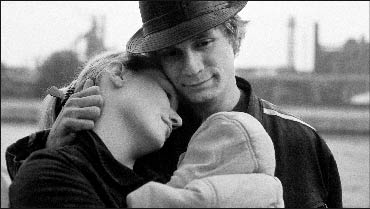Life With Father: L'Enfant
by George Sax

The moral improvements wrought by the unexpected obligations of childcare are a thematic staple of literature and drama. George Eliott’s gloomy 19th-century novel, Silas Marner, Damon Runyon’s comic 1930s racetrack story, Little Miss Marker, and this year’s winner of the best foreign film Oscar, the South African entry, Tsotsi, all revolve around children redeeming the blighted lives of their new custodians.
The newest film of the Belgian brothers Jean-Pierre and Luc Dardenne has a superficial resemblance to Tsotsi, but it differs importantly in its focus, tone and concerns. It lacks the South African film’s mix of crude sentimentality and blunt brutality. L’Enfant also features a young urban outlaw and a baby, but this time the child is the leading character’s newborn son and there is no parent-child bonding in the offing.
On the day after 20-year-old Bruno meets the infant and is given it to mind by his girl while she applies for family benefits, he sells it to a black market adoption ring. It is this almost reflexively mercenary and unintentionally cruel act that begins Bruno’s ordeal, an increasingly harrowing odyssey through the streets and back alleys of Seraign, the bleak, depressed eastern Belgian industrial river port that is the Dardennes’ hometown.
As L’Enfant opens, Sonia (Deborah Francois) is searching, child in arms, for her son’s father after being released from a maternity ward that he never visited. She finds that Bruno (Jérome Renier) has sublet their apartment to strangers in her absence, and when she finally locates him as he tries to work some scam in the city’s streets, he’s pleased enough to see her, but apparently about as interested in showing her his new stadium jacket as he is in the kid.
When Bruno returns from his unthinkingly callous transaction with his new bankroll—it’s probably the most money he’s ever had—he’s shocked by Sonia’s stricken response and physical collapse. This lumpen boy is more cheerfully venal and amiably amoral than truly wicked. And as he rushes about the city trying to repair a situation he never contemplated, he’s at least as concerned with his own deteriorating prospects as with Sonia. And for good reason, as it soon transpires. Nevertheless, there are very small hints of a barely awakened conscience. And as Bruno struggles with the direly descending spiral of consequences of his transgression, he musters a rude nobility that transcends his punk cool.
Renier, who played an ethically conflicted 15-year-old in the Dardennes’ La Promesse 10 years ago, is consistently convincing as Bruno’s initial complaisance is assaulted by his confrontation with stark realities. Renier has a mildly, pleasantly vulpine face, a blonde thatch above, and what at first seems a boyishly blank aspect begins to convey, in embattled glances, and small, tense mouth movements, glimpses of stress, confusion and eventually misery.
Francois’ depiction of Sonia’s sharp transition from delight in her attachment to this casually attentive lover to a furious disillusionment is impressive.
The Dardennes’ presentation of the film’s events is intent but dispassionate. It’s almost as if they were as concerned to find out what will happen as anyone else. L’Enfant is aesthetically spare, but its spirit of moral austerity proves more apparent than actual. Out of the steadying concentration on social details, the periodic scene-setting cityscape shots, the lingering mid-shots of Bruno and the camera’s patient tracking of the action, a tension evolves and tightens, and it has as much to do with human possibilities as narrative suspense.
The filmmakers are scrutinizing the condition of this youth floundering in an urban scene with which they’re more than familiar, and while they are scarcely pushing philosophical or socio-economic generalizations, Bruno’s adventure does seem meant to evoke understanding. (A previous Dardenne film, Rosetta, helped lead to the passage of a minimum-wage law for youth in Belgium.)
At the end, L’Enfant’s resolution, and its impact, are balanced on the possibility of redemption and hope. You may find yourself withholding judgment of Bruno in the face of L’Enfant’s powerful sense of transcendent potentiality.
L’Enfant will be shown through May 9 only on the Emerging Cinema screen at the Market Arcade Film and Arts Center, 639 Main Street.
|
Issue Navigation> Issue Index > v5n18: Best of Buffalo (5/4/06) > Film Reviews > Life With Father: L'Enfant This Week's Issue • Artvoice Daily • Artvoice TV • Events Calendar • Classifieds |









 Current Issue
Current Issue